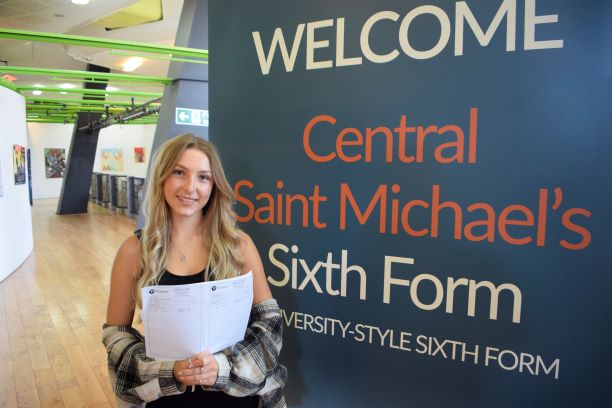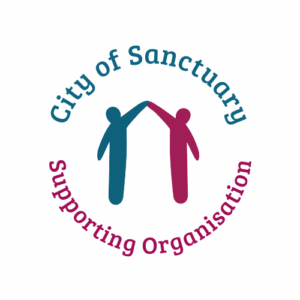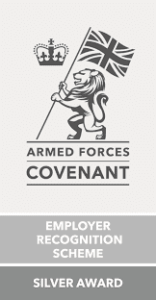Blog by Lilly Paterson: A*AB Media/English Language & Literature/Maths – Accounting & Tax Apprenticeship at PwC
I came to Central Saint Michael’s after a year of studying music at a college in Birmingham (looking back, that whole time feels like a blur). It wasn’t until I came to Central Saint Michael’s that I felt as though I was doing something constructive and that my hard work was going noticed.
Don’t get me wrong, I was nervous, I thought that I’d be judged because I had gone to study music for a year rather than start my A Levels. Thoughts flooded my head; will everyone think I’m not as smart? What if I struggle more?
That brings me to what I wish someone had told me before I started sixth form!
1. Pick subjects that you enjoy
The subjects you choose will be your primary focus for the next two years, so why not make those two years more enjoyable? The chances of you going into a job which you’re going to hate are slim right? Well, I’d hope so as why would anyone choose a job they despised? So by choosing subjects you are fond of, you can already start to set your dream career into focus. Another basic reason to choose subjects you enjoy is because you are ten times more likely to put energy, time and focus into a subject you enjoy learning than one you don’t. This results in better focus and grades for you, as well as your interests being fulfilled! It’s a win-win situation!
2. Your age doesn’t matter!
As soon as I stepped into my first class I realised there were students who were 19 and 20 (I wasn’t alone!). And no one asked me about my age, no one judged me for taking that year out. Instantly it was as if someone had taken the weight from my shoulders, and I felt relaxed. Well, more relaxed than I was to start. That was until the workload started.
3. The step from GCSE to A Levels is a jump not a step!
My initial thinking was that A Levels would be a slightly harder version of GCSE. Oh how wrong could I be. No, A Levels instead required twice the amount of work that GCSEs did. I remember choosing Maths as one of my A Levels, as in theory I figured it would be similar to GCSE Further Maths, however when I stepped into my first class I was informed it would involve statistical work and studying mechanics. As you can imagine I had a great shock but I was willing to put the work in and try my best. Just don’t underestimate that step, or should I say jump, from what you know to what is yet to come.
4. The workload is not like high school.
There are no little tasks or 5 question homeworks. No, A Levels require a more in-depth thought process, especially in subjects like English and Media Studies. The best answers are the perceptive ones!
5. From AS to A2…
Now you’re prepared for the jump from GCSE, it’s time that I warn you about the leap from your first year (AS) to your second (A2). I think what makes this jump so hard is the amount of content you need to know, but with the right preparation and dedication you’ll manage just fine. In A2 the exams are on everything you have been taught during the past 2 years, as opposed to just a year in AS exams. My key tip for preparing for A2 and your final exams would be to keep revising AS content throughout the year, and don’t be afraid to ask teachers if they have spare time to go over certain topics you possibly neglected in AS. Part of the jump from AS to A2 is the inclusion of more complex coursework. I cannot stress enough that the best thing you can do for coursework is get it finished as early as possible in the year! Not only is it then out of the way and not a worry, but you also then have multiple opportunities to ask for guidance to improve and fix errors. This may seem a small benefit but in some subjects coursework can take up a huge part of your final grade, so it’s good to showcase your best work.
6. Time management is key!
College can get overwhelming quickly, especially when you have so many different subjects and due dates for different things. That’s why organisation and time management are key. By organising when you plan to revise or study certain subjects, not only do you limit your worry and stress about when you’ll have time to fit things in, you also save time you would otherwise spend procrastinating and are more likely to actually get on with the tasks you set yourself as you can limit distractions by planning around your studies.
7. Self-motivation
College is different to high school, especially at Central Saint Michael’s. No one is there to tell you to finish your work or give you detention if you don’t. You are at college for You! No one is forcing you to come in, but Central Saint Michael’s do encourage and support you hugely. There are so many tutors and teachers you can express your concerns to, as well as so many quiet spaces to study if you find it hard to focus at home. You need to have that self-motivation and desire to do well when at college, but Central Saint Michael’s celebrates your efforts and supports you every step of the way.
8. Speak up!
Don’t ever be afraid to ask for help, whether it’s personal, academic or any other issue. The staff at Central Saint Michael’s are there to help and assist you through your time there, and most of all they want to! If you’re concerned about university or want help picking an apprenticeship, there are support sessions you can schedule or you can even speak to your subject teachers or form tutors who can put you in touch with the specific people who can help you in college. Your teachers just want you to do your best, they might ask you to come in for extra sessions or even set you up meetings with mentors (students in A2) who can assist you personally. The teachers are always just looking for ways to help.
9. You’re here to learn
Throughout high school if I raised my hand and got a question wrong I would die of embarrassment and think everyone was laughing at me. Spoiler alert: NO ONE CARES! It really doesn’t matter if you get a question wrong or you don’t know an answer, that’s why you’re at college: to learn. It’s completely human to make mistakes, that’s how we learn and improve. Teachers won’t ridicule you or make fun of you if you’re unsure of an answer, no, they are there to support and teach you. So next time, put your hand up!
10. Take care of yourself!
If 2020 has taught us anything, it’s that mental health is a huge factor of our overall health! And whilst college does involve a lot of work and study time, it’s also really important that you take time for yourself and your well-being. Whether your downtime is watching your favourite Netflix show, going on a walk to clear your mind, going out with friends on the weekend or even just having a nap, it’s vital that you take time out of a busy work schedule to relax. Not only will you feel better for it, but you’ll also find that you have better focus when it comes to your work, as you’re not depriving yourself of fun! Finding that balance is key and there are many people at Central Saint Michael’s who can help with this. During lockdown a telephone service was even put into motion where teachers could refer students, who said they were struggling, to a specific wellbeing expert in the school to whom they could talk confidentially and openly about concerns.
College is a big step up from high school, but hopefully some of this advice helps you, as well as the reassurance that Central Saint Michael’s Sixth Form is a great place to study, and is an institution that really supports, accommodates for and cares for its students every step of the way! Change can be good… I promise!














